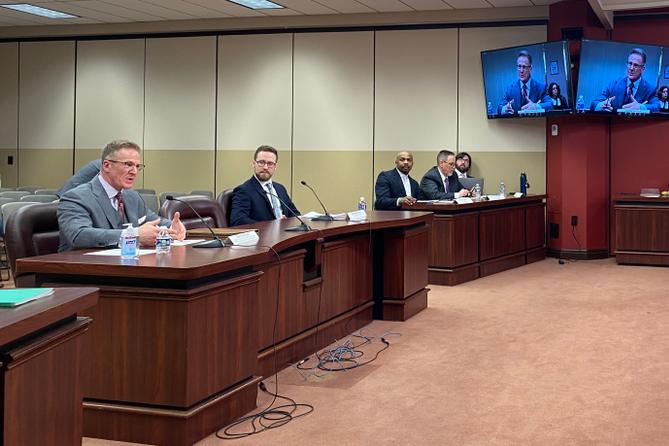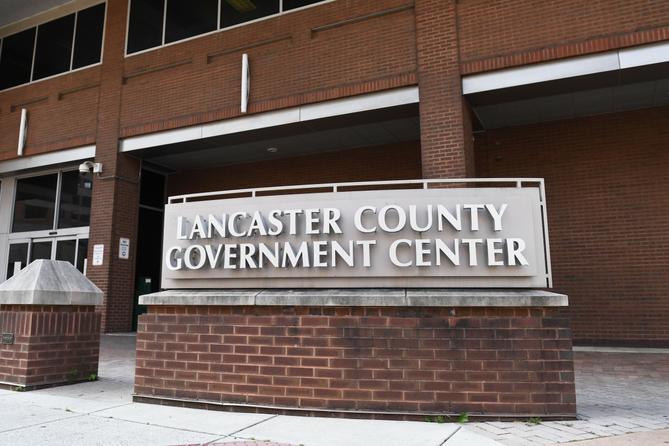This story first appeared in The Investigator, a weekly newsletter by Spotlight PA featuring the best investigative and accountability journalism from across Pennsylvania. Sign up for free here.
HARRISBURG — When Lancaster County officials discussed ways they could use opioid settlement money, they identified their drug task force as a priority. They proposed spending $275,000 a year from the funds on it.
And after reaching out to the state oversight board that’s responsible for ensuring counties appropriately spend hundreds of millions of settlement dollars, they recently received a greenlight to do so. But the county’s plans remain unclear.
The action and uncertainty illustrate the ongoing debate — which is sometimes occurring out of public view — over how to spend Pennsylvania’s opioid windfall. Agreements with Johnson & Johnson and three major drug distributors are expected to bring about $1 billion to the state over 18 years, most of which will go to counties. Other opioid cases are expected to bring even more.
As Spotlight PA and WESA reported in April, some counties want to use opioid settlement money to help police officers make arrests. But a range of harm reduction and treatment advocates have raised concerns that such actions could crowd out more pressing needs, stray from the intended purpose of the opioid settlements, or perpetuate a war on drugs mindset.
“These funds were intended to help individuals start rebuilding their lives,” Jason Snyder, who advocates for addiction treatment providers on behalf of the Rehabilitation and Community Providers Association, told Spotlight PA.
He thinks annually using $275,000 to support the general operations of a drug task force is “far outside the spirit of what the settlement was intended to be.”
Democratic Gov. Josh Shapiro — who was involved in negotiating settlements with drug companies as the state’s attorney general — has described the settlement money as “earmarked to offer and expand life-saving treatment options.”
That outlook starkly contrasts with the law enforcement plans that some county officials have pursued, including in Lancaster County, where officials wrote that “Preventing Drug Dealers from preying on our community” should be a priority for the funds.
Lancaster County’s solicitor reached out to the Pennsylvania Opioid Misuse and Addiction Abatement Trust, a 13-member oversight board comprising various state and local officials, to clarify the issue. The trust provided a response in a July 11 email, which Spotlight PA obtained through a Right-to-Know request.
“In regard to your question about the use of settlement funds for the County’s Drug Task Force; the Trust’s Advisory Committee met and discussed the ask,” the email from the trust said. “The Trust will generally approve the request but suggests having a mechanism in place to identify if the money spent is actually working and keeping drugs out of the jail.”
It’s not clear what the trust was referring to when it mentioned “keeping drugs out of the jail,” and trust officials declined to clarify to Spotlight PA. The trust’s email to Lancaster County also noted that the county’s spending plan must “all be directly related to Exhibit E and the list of approved Opioid Remediation uses” — a reference to settlement documents that include categories of approved and recommended uses. Those potential uses are broad, and the trust’s message to the county said that the full details of reporting requirements are still being developed.
The question of what types of law enforcement spending are allowed has been an early point of contention and confusion. The trust issued guidance in February telling counties that “Drug enforcement efforts are not explicitly authorized under Exhibit E,” but also noting counties could seek permission “from the Trustees and ultimately Commonwealth Court, and if approved may use funds for that purpose.”
County officials are required to file opioid settlement spending reports by March 15 of each year with the trust, although the trust waived that requirement in 2023. If trust officials determine county officials spent money inappropriately, they can withhold money. If county officials don’t fix the issue, the trust can cut their funds.
Ahead of those annual reporting deadlines, a committee of trust officials also meets to discuss questions submitted from the public and counties, and to draft clarifying questions. At a public meeting in May, the chairperson of the trust, Tom VanKirk, said the board planned to post its answers online for “public consumption.” But as of July 28, the trust website did not include this information.
Gail Groves Scott, a public health policy researcher and advocate in Lancaster County, criticized the use of opioid settlement funds for a drug task force and said the trust should publicly share the guidance it gives counties.
“We’ve learned from previous types of settlements like this … that if there isn’t a light being shown on where the money’s going that some of it won’t be spent appropriately,” Groves Scott, who serves on an advisory group for the Pennsylvania Harm Reduction Network, told Spotlight PA.
“We need to have access to the documents so we can hold people accountable before they spend the money, not wait till afterwards,” she added.
Trust officials declined interview requests from Spotlight PA, and in a statement the trust referred to the spending and reporting requirements included in the order creating the trust. The statement did not acknowledge that the trust told Lancaster County officials it “will generally approve the request.”
Michael Fitzpatrick, a spokesperson for Lancaster County’s commissioners office, declined to say whether the county would move forward with funding the drug task force with opioid settlement money, saying on July 20 that “you have all of the most up to date information that we have” and that discussions will continue to occur at public meetings.
The Lancaster County district attorney’s office — which oversees the drug task force — indicated officials are considering changes.
“You should … be aware that the request is being looked at and amended to focus on our role in Treatment Courts, and education, used drop-off medication sites and other goals set forth in Exhibit E,” Sean McBryan, a spokesperson for the office, wrote on July 26 in response to Spotlight PA questions. “The request is not finalized, however.”
The drug task force primarily focuses on “mid to upper level drug dealers in Lancaster County” but members also “assist local police departments with street level drug dealing when requested,” according to its website. It currently receives funding from the state attorney general’s office, the county, and local municipalities, and by seizing property related to alleged drug crimes, according to the district attorney’s office and county meeting minutes.
In the 2020-21 fiscal year, Lancaster County received about $316,000 from seized cash or related to the sale of forfeited property, according to an annual drug forfeiture report from the attorney general’s office.
The county’s opioid settlement plan also includes using money for a criminal justice diversion program, medication-assisted treatment for people in jail, and resources for school-age children.
Jacquelyn Pfursich, the county’s solicitor, previously told the state opioid trust that spending settlement funds on the drug task is part of the county’s “multifaceted” plan “to address the various impacts of the opioid crisis.”

Other requests for guidance
Officials in other counties have turned to the trust for guidance on how they can spend opioid settlement money, records obtained by Spotlight PA show.
Gabriel Magee, a private attorney representing the Clearfield County district attorney in opioid litigation, asked if settlement funds could be used to fund or partially fund a county detective position. The detective could review applications for a proposed diversion court program and “investigate higher-level and more complicated drug-related crimes, such as pill mills and organized drug distribution networks,” he wrote.
Magee told Spotlight PA on July 20 that he had not received an answer from the trust.
In southwestern Pennsylvania’s Greene County, the chief clerk and administrator reached out to the trust to confirm county officials could spend opioid settlement money on a body scanner at the county jail, in an effort to keep illicit drugs out of the facility. County officials proposed splitting the cost — estimated at $159,000 total — evenly between opioid settlement funds and other sources.
“Greene County has experienced two overdose deaths in our County Jail in the past couple of years,” Jeffrey Marshall, chief clerk and county administrator, wrote in a message to the trust, adding that the scanner “would allow jail personnel to find the drugs before someone has the opportunity to overdose.”
Marshall told Spotlight PA he asked the trust in May about the scanner and then followed up in June. A representative for the trust replied on June 9 that a committee had provided preliminary approval for the county’s request and formal notification would follow the next week, records obtained by Spotlight PA show. As of July 20, Marshall said he was still waiting on that formal notification.
But county officials decided to move ahead with the scanner anyway, and Marshall told Spotlight PA it should be installed soon.
“Honestly, we got to the point we weren’t even going to wait any more,” Marshall told Spotlight PA, later adding, “If we can’t use the opioid monies, we’ll use other funds.”
WHILE YOU’RE HERE… If you learned something from this story, pay it forward and become a member of Spotlight PA so someone else can in the future at spotlightpa.org/donate. Spotlight PA is funded by foundations and readers like you who are committed to accountability journalism that gets results.

